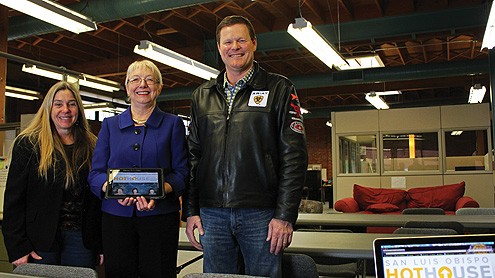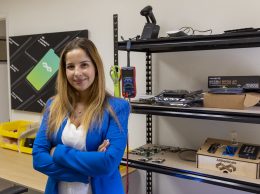Warm reception for HotHouse: SLO startup incubator opens in downtown location

From left: Thea Chase, director of the San Luis Obispo HotHouse, Jo Anne Miller of SLO Seed Ventures, and Clint Pearce, chairman of the HotHouse Community Advisory Board. The startup incubator recently opened on Morro Street in downtown San Luis Obispo. (Alex Kacik photo)
A business incubator aims to scale up its support of San Luis Obispo startups at its new downtown location.
The San Luis Obispo HotHouse is a blend of a business incubator, accelerator and co-workspace. Incubators are designed to support entrepreneurial companies through business support resources, like accounting or legal help, and access to funding. Accelerators give entrepreneurs access to investors who fund companies in return for a 5 to 8 percent equity stake.
The SLO HotHouse was originally launched by the Cal Poly Center for Innovation and Entrepreneurship as a 12-week summer accelerator that provides Cal Poly students or recent graduates $7,500 to start a business. The center’s Founders’ Circle, which is made up of local business owners and Cal Poly alumni, provides the funding but does not receive any equity in the companies.
In addition to funding, fellow entrepreneurs can build off each other’s experience in the shared, open workspace while mentors from the CIE and the Small Business Development Center offer their advice on topics like marketing and finance.
The summer accelerator has grown into a year-round incubator, which is now housed at a 6,000-square-foot space once occupied by the city’s Public Works Department at 955 Morro St. The nonprofit will be open to local entrepreneurs outside of the Cal Poly community after the ribbon cutting ceremony on Feb. 27. When the initial accelerator program ended in September 2011, the student teams didn’t want to leave, said Clint Pearce of Madonna Enterprises, Founders’ Circle member and HotHouse Community Advisory Board chair.
“It’s hard to go back and work by yourself in your dorm room after you have access to a professional and collaborative environment. That demand drove it,” said Pearce, who provided commercial space in 2011 to get the HotHouse going. “It’s good for the community to have bright minds starting new businesses here that will eventually provide head-of-household jobs and spur economic development.” What starts out as a passion can blow up for reasons the entrepreneurs haven’t anticipated. “You never know,” he added.
The HotHouse operational costs run about $300,000 a year, but it’s able to tap into a diverse funding base that allow students to “live their dreams,” said Thea Chase, CIE managing director and HotHouse executive director.
“That’s really what’s exciting here — when you get to give a high five to one of the teams who raised its first round of funding or earned its first revenue,” Chase told the Business Times. “We can provide the connections and the opportunity to advance ideas. In the long run, that’s what helps the economy go and helps people get jobs. But in the smaller picture, it’s about helping entrepreneurs create their first sale.”
The goal is to foster a successful startup culture in San Luis Obispo that will in turn attract students and businesses, said Dave Christy, the dean of the Cal Poly Orfalea College of Business and HotHouse Community Advisory Board member. The HotHouse charges monthly, tiered membership fees based on how long teams have been there. While the incubator aims to be self-sustaining, it will need continued support from donors and the community, he said.
“Those fees aren’t enough to supply the staff and they don’t come anywhere near to the amount money we get from the community,” Christy said. “If [the donations] dry up, we’re in trouble. But we’re all passionate about it, it’s part of what we want to do to establish a thriving entrepreneurial community. As long as we remain partners and everyone chips in, we can do this.”
Entrepreneurs must apply to the HotHouse and go through a screening process to ensure they are a good fit. Two of the five startups that are enrolled in the HotHouse are InPress Technologies, which created a medical device to help the body naturally heal itself in the event of post-partum hemorrhage, and RepairTech, which created software that helps computer repair technicians diagnose multiple computers more efficiently.
RepairTech CEO and co-founder Ian Anderson said the HotHouse has been an invaluable resource. It helped the company grow faster because mentors were just across the room ready to help the company circumvent any roadblock while fellow entrepreneurs made the onerous task of starting a business less daunting, he said.
“The HotHouse provided a safe zone that allowed us to make mistakes in the summer, ask questions to people who have done this before,” said Anderson, a recent Cal Poly computer engineering graduate. “As a startup straight out of college without any real industry experience, there is a daunting list of things to do, and it helped mitigate those fears when we felt overwhelmed. It gave us the motivation to keep going.”
The idea of entrepreneurship and business incubation is spreading throughout the Central Coast. Cal Poly has an entrepreneurship and business concentration under the Orfalea College of Business and has a student-run organization Cal Poly entrepreneurs. UC Santa Barbara has a Technology Management Program that functions like a business program and grants certificates and is currently branching into a graduate program. The Synergy Business & Technology Center, a business incubator in downtown Santa Barbara, opened in mid-2012, about a year after cloud computing company RightScale took over the 26,000-square-foot Santa Barbara Business & Technology Center at 402 E. Gutierrez St., and the city of Ventura has successfully run a public-private incubator in a city building for several years.
The HotHouse can help create long-term, sustainable job growth and a balanced local economy, said Michael Manchak, president and CEO of the Economic Vitality Corp.
“San Luis Obispo County is at the forefront of positive change and is experiencing its fair share of startups and resources to foster them,” he said. “There has been more positive movement and support of entrepreneurship in the last three years by Cal Poly than it has over its 100- year history.”
San Luis Obispo has spawned several successful companies like Shopatron and Mindbody, and the HotHouse is an important step to spin off more high-growth startups, said Jo Anne Miller of SLO Seed Ventures and the Founders’ Circle. While the city is heading in the right direction, available housing and transportation have limited its growth, she said.
“I’ve watched San Luis Obispo progress over last couple of years and I’m hoping this can grow to a place where high-growth startups can thrive, stay here and add jobs,” Miller said.
HotHouse supporters hope that it will outgrow its space at 955 Morro St. in two years. The incubator is an opportunity to change the local culture and economic conditions so that more new ventures can be successful here, Christy said.
“There are social and environmental policies that constrict growth,” he said. “Whether it’s a lack of permits for buildings, a lack of infrastructure or anti-business sentiment, there’s not a significant amount of development. But this can be a leading light as far as economic growth here.”












